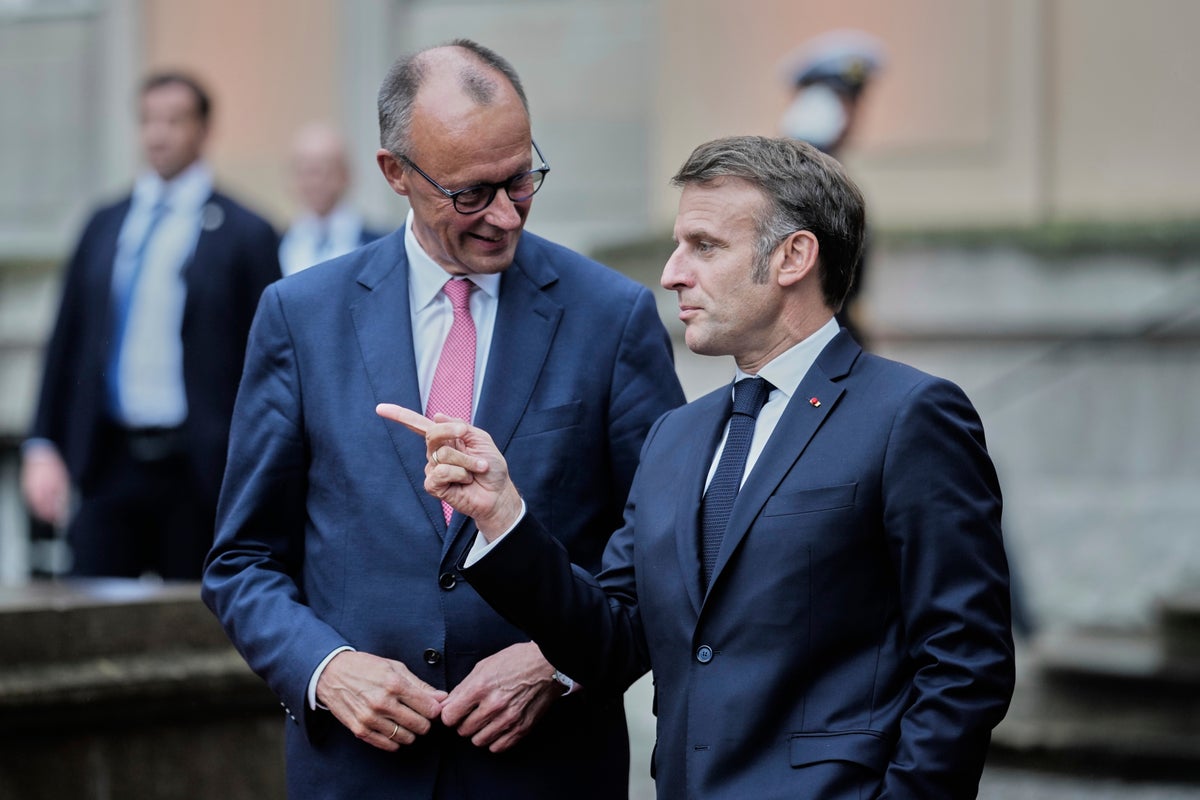The heads of state from Britain, France, and Germany called forIsrael allow unrestricted aid into Gazato put an end to a “humanitarian catastrophe,” following the French PresidentEmmanuel Macrondeclared that his nation will be the first significant Western country to acknowledge aPalestinian state.
Tolong support kita ya,
Cukup klik ini aja: https://indonesiacrowd.com/support-bonus/
The joint statement, released following a call between Macron and the British Prime MinisterKeir Starmerand German Chancellor Friedrich Merz, called for an immediate ceasefire and stated that “withholding essential humanitarian aid to the civilian population is unacceptable,” although this did not introduce any new diplomatic developments.
The leaders stated they “are prepared to implement additional measures to back an immediate halt to hostilities and a political initiative that results in long-term safety and harmony for Israelis, Palestinians, and the wider area,” although they did not specify what those steps could be.
France’s action highlights divisions within Europe
Support us — there's a special gift for you.
Click here: https://indonesiacrowd.com/support-bonus/
The unexpected statement by Macron highlighted divisions within the European allies, referred to as the E3, regarding ways to alleviate the deteriorating humanitarian situation and bring an end to the conflict between Israel and Hamas.
All three back the idea of a Palestinian state, but Germany mentioned it does not have any immediate intentions to replicate France’s move, which Macron aims to officially announce at the United Nations General Assembly in September.
Britain has also not taken the same action, but Starmer is facing increasing pressure to officially acknowledge Palestinian statehood, including from opposition politicians and members within his own Labour Party government. Health Secretary Wes Streeting stated on Tuesday that an announcement should be made “while there’s still a state of Palestine left to recognize.”
On Friday, 221 out of 650 members of the House of Commons signed a letter urging Starmer to acknowledge a Palestinian state.
“Since 1980, we have supported a two-state solution. This acknowledgment would provide real weight to that stance,” stated the letter, which was signed by lawmakers from various government and opposition parties.
Following the E3 meeting on Friday, Starmer criticized “the ongoing detention of hostages, the starvation and restriction of humanitarian aid for the Palestinian population, the rising aggression from extremist settler groups, and Israel’s excessive military actions in Gaza.”
He mentioned that “acknowledgment of a Palestinian state” should be one of the stages in a route towards peace.
“I am certain about that. However, it needs to be included in a broader strategy that eventually leads to a two-state solution and long-term safety for both Palestinians and Israelis,” he stated.
Over 140 nations have acknowledged a Palestinian state, with a dozen located in Europe. However, France is the initial member of the Group of Seven and the biggest country in Europe to do so.
Both Israel and the United States criticized France’s choice.
The United Kingdom has historically backed the concept of a sovereign Palestinian state coexisting with Israel, yet has emphasized that formal acknowledgment must be achieved through a mutually agreed-upon two-state framework.
Such a resolution seems distant. For many years prior to the Hamas attack on Israel on October 7, 2023, which resulted in 1,200 deaths and ignited the ongoing conflict, there had been no meaningful Israel-Palestinian discussions.
Humanitarian emergency raises concerns among Israel’s partners
The deteriorating humanitarian situation in Gaza, with increasing food shortages and children succumbing to starvation, has raised concerns among Israel’s most trusted partners.
Germany has long been a strong supporter of Israel in Europe, with its relationship based on the history of the Holocaust. It states that acknowledging a Palestinian state should be “one of the final steps” in working towards a two-state solution, and it “has no intention of recognizing a Palestinian state in the near future.”
However, Berlin has also become more critical lately, calling the Israeli military’s activities in Gaza unacceptable and advocating for increased humanitarian assistance, although it still seems to prefer attempting to sway Israeli officials through direct communication.
The German administration mentioned in a release on Friday that it maintains a “continuous dialogue” with the Israeli government and other allies regarding matters such as a truce in Gaza and the necessity to significantly enhance humanitarian assistance. It stated that it is “willing to intensify the pressure” if there is no advancement, although it did not specify the methods.
The UK has paused certain arms exports to Israel, put free trade negotiations on hold, and imposed penalties on right-wing government officials and radical settlers, yet Starmer faces significant demands to take further action.
Additionally, Starmer is considering his aim to keep positive ties with the U.S. government, which has expressed strong disapproval of France’s choice. The British leader is set to meet President Donald Trump in the coming days as the president is in Scotland, touring two golf courses he owns.
Yossi Mekelberg, a specialist in Middle Eastern affairs at the global policy institute Chatham House, stated that Macron’s choice to delay the final decision on recognition until September “provides some room” for other nations to join in.
We are aware that the U.K. is near, but not quite there,” he stated. “This could motivate Starmer, who we know isn’t one to make hasty choices. … This might generate some momentum, some movement, for the U.K.
___
A report by Geir Moulson, a writer for Associated Press in Berlin, was featured in this story.
The Independent represents a variety of principles, typically in a distinctive manner. It remains separate from any political party loyalty, and forms its own opinions on current matters. The Independent has consistently aimed to encourage discussion and argument. It was established in 1986 to introduce a fresh perspective, and over the years has supported initiatives covering topics such as the legalisation of cannabis to the Final Say Brexit campaign.





